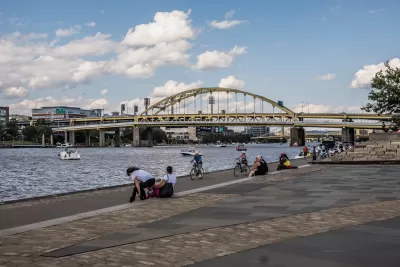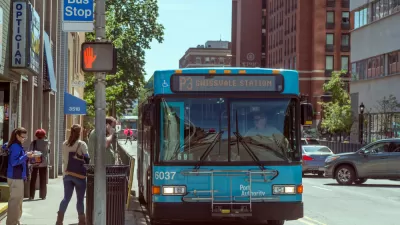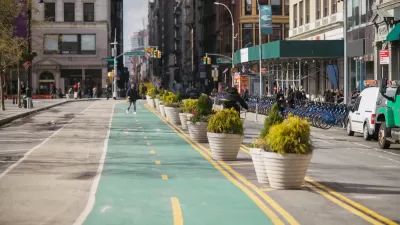A two-year pilot program aims to provide an integrated, multimodal, and affordable transportation system across the city combining transit, bikes, e-scooters, and other options.

Writing in Government Technology, Skip Descant describes the city of Pittsburgh’s Move PGH mobility-as-a-service pilot program, a two-year experiment that focuses on creating an integrated, affordable, and accessible multimodal transportation system.
According to Descant, “Affordable and accessible transportation has become a policy goal at all levels of government, as officials concede it is essential to ensure access to jobs, health care, education and offers a path to upward mobility that lifts people from poverty.” As such, Pittsburgh’s program offers a 30 percent discount on rides taken in geographic “equity areas,” as well as an 80 percent discount for income-qualified residents. “So far, nearly one million trips have been taken on about 1,000 scooters in Pittsburgh, with about 200,000 people signing up to use the Spin scooters. Based on survey data, more than a third of those million trips would have been taken in a car, were the scooters not available.”
As Descant explains, “Move PGH is a pilot which city officials would like to see evolve into a more permanent fixture in Pittsburgh. That will require some action at the state level to allow e-scooters. The devices are allowed to only operate in Pittsburgh, and only as part of the pilot.”
FULL STORY: Pittsburgh Mobility Pilot Builds on Transportation Equity Goals

Planetizen Federal Action Tracker
A weekly monitor of how Trump’s orders and actions are impacting planners and planning in America.

Maui's Vacation Rental Debate Turns Ugly
Verbal attacks, misinformation campaigns and fistfights plague a high-stakes debate to convert thousands of vacation rentals into long-term housing.

Restaurant Patios Were a Pandemic Win — Why Were They so Hard to Keep?
Social distancing requirements and changes in travel patterns prompted cities to pilot new uses for street and sidewalk space. Then it got complicated.

In California Battle of Housing vs. Environment, Housing Just Won
A new state law significantly limits the power of CEQA, an environmental review law that served as a powerful tool for blocking new development.

Boulder Eliminates Parking Minimums Citywide
Officials estimate the cost of building a single underground parking space at up to $100,000.

Orange County, Florida Adopts Largest US “Sprawl Repair” Code
The ‘Orange Code’ seeks to rectify decades of sprawl-inducing, car-oriented development.
Urban Design for Planners 1: Software Tools
This six-course series explores essential urban design concepts using open source software and equips planners with the tools they need to participate fully in the urban design process.
Planning for Universal Design
Learn the tools for implementing Universal Design in planning regulations.
Heyer Gruel & Associates PA
JM Goldson LLC
Custer County Colorado
City of Camden Redevelopment Agency
City of Astoria
Transportation Research & Education Center (TREC) at Portland State University
Jefferson Parish Government
Camden Redevelopment Agency
City of Claremont





























